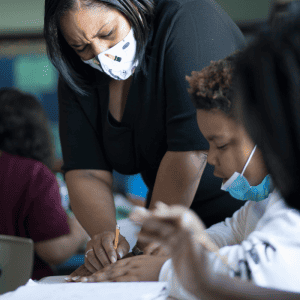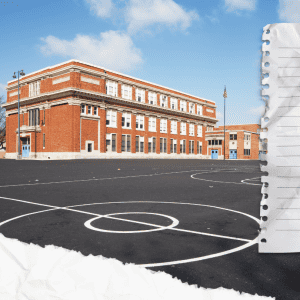
Preparing School Leaders to Succeed in a “New Normal”
02/09/2024

Instructional Leadership Matters
For many potential school leaders, the preparation experience is like swimming in the shallow end of the pool. It’s a lot of learning and applying transactional skills around school budgeting, school law, and instructional observations. But the role of an effective school leader demands so much more.
In reality, these leaders will find themselves at the deep end of the pool of much more than they expect. Their teams and their community look to them to set an agenda for school improvement, cultivate a positive and supportive learning environment, and coach and develop others to ensure the work that results in learning and belonging for all children is prioritized.

So, what would it take for school leaders to be better prepared for the critical role they play in a healthy instructional system? I have some thoughts.
COVID Magnified the Challenges That Already Existed

Until I joined Leading Educators last year, I was a principal manager and instructional superintendent with Chicago Public Schools for six years. There were countless times I ended the day wondering, “Will it always be this hard?”
When the COVID-19 pandemic hit, seemingly everything changed. Most buildings went into survival mode. School leaders spent most of their time helping students and families adjust to remote or hybrid learning environments.
During this period, I and many school leaders were charged with distributing technology devices to school families and following health protocols to mitigate safety challenges within the school community. The sheer number of logistics and operational changes overwhelmed the principal’s capacity to focus on coaching and developing teachers with remote teaching skills.
As schools reckon with the pandemic’s aftermath and the realities of a rapidly changing future, the complexity of the work remains.
- School leaders must be equipped to maintain sustainable systems and structures that promote grade-level, joyful instruction for all students.
- They must also champion support for academic and social-emotional learning, actively leverage parent and community stakeholders, and balance district initiatives that may or may not align with their school’s priorities.
The recovery from COVID requires that our principals focus on the instructional planning and pedagogical practices of teachers working to help all students recover and rebound from lost instructional time. With that in mind, I offer a call to action for the sector.
Rethinking Principal Prep for 2024 and Beyond
The disconnect between the school leadership preparation programs and the practical application of this learning makes for a rude awakening when school leaders take the helm of the school.
Thus, it is imperative for school districts and organizations to provide training and coaching for school leaders to navigate a broader set of responsibilities, delegate and manage student achievement through an instructional leadership team, and make a positive impact for all students.
Previously, I worked with aspiring principals and aspiring assistant principal programs within Chicago Public Schools that provide a “residency” experience for current teacher leaders through cohorts. The residents in these cohorts self-assess and reflect on their leadership capabilities to form a leadership development plan.
With this plan, they set individual goals along with milestones for progress monitoring. Many of these plans focus on high-leverage areas, including instructional leadership, change management, or school climate and culture, that align with the priorities of a school’s improvement plan. The resident’s focus is guided by activities that directly align with the school’s priorities to make this experience both authentic and impactful. This plan is implemented and monitored through a mentor leader and/or leadership coach within the school to ensure that the future leader is growing and developing.
Since leaving a school system to support them from the outside at Leading Educators, it has become ever more clear that school leaders must know and apply systems and structures that promote grade-level instruction. According to summative state assessments, many students are not at grade level, and teachers will need tools and strategies to offer consistent and intentional high-quality, grade-level learning.
Better Support and Greater Impact is Possible
I have seen firsthand that great results happen when school leaders cultivate an ecosystem that provides job-embedded learning in consistent cycles that encourage collaborative practice.
- Teachers must know how to unpack the grade level standards, internalize curricular resources, analyze student work, and utilize student assessment data to inform instruction.
- Additionally, teachers must have opportunities to be observed during instruction and receive actionable feedback that guides their practice.
For this learning and collaboration to take place, school leaders have to set the conditions and expectations. This includes fostering the mindset that collaboration is essential and providing the time and space for professional learning with peers.
leadership qualities that help school leaders succeed
- Be constant learners, motivators, team players, and creative problem solvers. Being a lead learner means showing how important it is to keep growing professionally. Leaders must walk the talk and ensure everyone knows that learning is ongoing.
- Be the go-to problem solvers for all sorts of challenges. They might not have all the answers, but they know how to find the resources to tackle issues related to teaching, school culture, involving parents, and connecting with the community. Collaboration is key – school leaders can’t do it all alone. They need to work closely with experts in the school community to make things happen.
- School districts can create programs that provide job-embedded training while aspiring leaders are still in teaching roles. Ideally, leaders will be able to carry the qualities that made them strong developers of students into becoming strong coaches, mentors, and advisors to their staff. Likewise, there are districts and organizations that have created residencies and training programs that offer professional learning for teachers who aspire to become assistant principals or principals.
These programs allow teachers to self-assess their readiness based on school leader competencies as well as engage in learning cohorts to develop their leadership acumen. It is also key to couple this learning with mentoring and coaching so that these aspiring leaders are given opportunities to shadow and partner with current school leaders.
Aspiring school leaders should experience a mentor principal leading school-based teams (i.e. Instructional Leadership Teams, grade-level teams, etc.), facilitating parent meetings, and leading cycles of school improvement initiatives. This experience allows the aspiring school leader to understand the thought process behind particular actions and reflect on these actions if they are encountered in a future endeavor.
Additionally, school leaders must know law and district policies to govern their actions within legal and ethical parameters. Districts must provide authentic leadership experience, including leading professional learning communities and active participation in school boards and parent-teacher organizations.
We cannot let our aspiring leaders continue to wade in the shallow end of the school leadership pool. We must prepare them to dive confidently and thrive in the deep end.
About Daniel Perry
Daniel has been an educator for more than twenty years, working primarily within Chicago Public Schools as a teacher, assistant principal, principal, Deputy Chief of Schools, and Chief of Schools. As Chief of Schools, he led 32 elementary schools (PreK-8th grade) in leadership development, professional learning, and curriculum implementation. In this role, selected schools partnered with Leading Educators to increase staff capacity in mindset and pedagogy of math instruction, as well as implementation with the district-created curriculum in English Language Arts. Daniel joined Leading Educators as Managing Director in early 2023.
Daniel earned his M.S. in Elementary Education from Northwestern University as well as an M.B.A. in Education Leadership from Keller Graduate School of Management. He was recognized as a CPS Principal Fellow in which he worked on educational policy as a Capstone project while receiving Executive Leadership training from Northwestern University.







